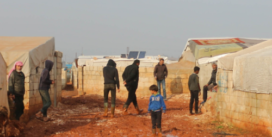- Fall Newsletter, 2025, Issue 15
- Using International Online Learning Modules to Engage Students in the Study of Critical Global Issues
- Upcoming Book Launch: Hearts of Freedom
- Announcing winners of the 2025 CARFMS Essay Contest
- The New York Declaration for Refugees and Migrants and its two Global Compacts: Addressing the Symptoms or the “Root Causes” of Forced Displacement?*
Urban Refugees: The Hidden Crisis, by Kelly Yotebieng
We’ve all seen the disturbing images of refugee camps from around the world. Those refugees are deserving of attention. But what the world has largely ignored are urban refugees, who often blend into the chaos of city life and aren’t so visible to the media.
Urban refugees have fallen even further below the radar. In anthropologist Michael Agier’s critique of the refugee camp apparatus, Managing the Undesirables, he reminds us that camps can be devices of exclusion (Agier, 2011). The United Nations High Commissioner for Refugees (UNHCR) estimates that 60% of the world’s 19.5 million refugees and 80% of 34 million internally displaced persons live in cities, and most of these cities are in developing countries, the majority in Africa. So, refugees in cities matter, but are often not the focus on media attention. In excluding urban refugees in the developing world from the majority of research and media coverage, we are excluding a significant portion of the world’s refugees. What are the repercussions the Eurocentric focus for refugees outside of the media’s hot zones?
This summer I attended the World Refugee Day events on June 20, 2016, in Yaoundé, Cameroon. In emphasizing the crisis to a large stadium full of refugees from approximately 15 African countries, several of the speakers focused on the Syrian crisis and those who were drowning at sea while trying to reach Europe.
These discourses were largely greeted by silence. However, when the President of Refugee Women in Yaoundé, a Rwandan refugee who has lived in Yaoundé for over 20 years, took the stage, she made it clear that because of the neglect of attention to urban refugees, situations were dire in the often crowded urban slums they were living in. She suggested that the lack of focus and support on urban refugees in developing countries across Africa has impacts for the future, on refugee women’s ability to become effective and contributing members to whatever society they end up in. Their potential to “hold their heads high in dignity” was being lost. This was followed by the President of the Refugee Collective, a Chadian refugee who had been in Cameroon for about as long. He argued that while it may seem that peace had returned to some of their countries, until you put yourself in the shoes of a refugee and understand the persecution they were fleeing, it would be hard to be able to comprehend why they did not want to go home. In today’s increasingly violent world, these “old” refugees, those not living in camps, are being forgotten. Sometimes they are even actively told to go home. Their countries are now peaceful. There are other priorities now.
A glimmer of hope however, the situations of urban refugees in developing countries have not gone entirely unnoticed. The United Nations High Commissioner for Refugees (UNHCR) 2009 policy on urban refugees and later report on alternatives to camps (2014) call for increased protection space, legal support, and advocacy with host country governments to build the resilience of urban refugees.
Don’t get me wrong, I have been heartbroken by the current situation in Europe. It is just that I was desperately hoping that the attention and focus on refugees globally would allow us to look at some of the related issues we should have been working on years ago. There are already so many displaced persons in the world, even before they flooded the gates of Europe more recently. But as countries like France are in the midst of plans to open up their first refugee camps, what can we learn from those who have been displaced for years, and how they have been able to rebuild their lives? Reiterating points made by Agier (2011), I suggest that camps, while well-intentioned, are hurtful rather than helpful solutions. Perhaps we should instead finally shift our attention to urban refugees in the developing world. In supporting and learning from urban refugees who have often spent decades figuring out their lives in displacement, I imagine we will be presented with some alternative solutions. We could leverage their wisdom to support the influx of new arrivals as people worldwide continue to be uprooted and chased from their homes.
Kelly Yotebieng, MPH has spent over thirteen years living and working in Central Africa region on issues related to maternal and child health, psychosocial support, and humanitarian programming with refugees and host populations. She is currently pursuing her Ph.D. in Cultural Anthropology focusing on resilience among urban refugees in Cameroon.
